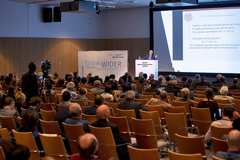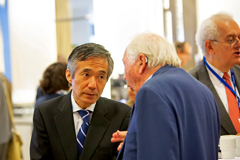Visiting Fellow Naohiro Kitano Participates in Discussions on Aid Policy at the WIDER Development Conference
2018.10.18
The United Nations University World Institute for Development Economics Research (UNU-WIDER) hosted the WIDER Development Conference in Helsinki, Finland, where the Institute is located, from September 13 to 15, 2018. Naohiro Kitano, visiting fellow and former director at JICA Research Institute, participated in the Conference, and served as chair for the "Aid Policy" session held on the 13th.
The conference theme was "Think development - Think WIDER." About 450 people from 55 countries participated in the three-day conference, including keynote lectures from former World Bank Chief Economist Kaushik Basu, who is a professor at Cornell University, and Economic Sciences Nobel Prize recipient Joseph Stiglitz, who is also a professor at Columbia University, and many sessions based on the findings of UNU-WIDER research projects.
The "Aid Policy" session included a discussion of aid policies, and on the current state and challenges of development finance in particular. Presentations were given by Richard Manning, visiting researcher, Blavatnik School of Government, University of Oxford and former chair of the OECD Development Assistance Committee (DAC); Justin Lin, councilor of the State Council of the People's Republic of China and former chief economist of the World Bank; and Danielle Resnick, senior research fellow, International Food Policy Research Institute (IFPRI). Louise Fox, chief economist, United States Agency for International Development (USAID) participated as a discussant. Participants also included United Nations University Rector David Malone, UNU-WIDER Chief Economist and Deputy Director Tony Addison, and a variety of other researchers and practitioners.

The WIDER Development Conference attracted about 450 people from 55 countries (Photo: UNU-WIDER)

Naohiro Kitano, JICA-RI visiting fellow, exchanged views with other researchers (Photo: UNU-WIDER)
First, Manning gave a presentation titled "Aid Policy: Continuity or Change?" He pointed out that, from the perspective of continuity, the trend of official development assistance (ODA) from DAC members is still on the increase in real terms, and there have been no changes to DAC’s development effectiveness policies that puts emphasis on country ownership and the issue of how to feedback evidence. From the perspective of change, Manning indicated the number of countries that have "graduated" from the International Development Association (IDA), which provides assistance to the poorest countries as the part of the World Bank is increasing, with India being an example of “graduated” country. He also cited the findings of research conducted by Kitano regarding estimates of China’s foreign aid to show the striking increase in the aid volume from non-DAC countries. In addition, he touched upon examples of scaling up lending operations at the Multilateral Development Banks.
In his presentation "Going Beyond Aid and Concessional Loans," Lin showed the prescription for development in developing countries suited to the new structural economics that he advocates, based on his book “Going Beyond Aid” that was published by Cambridge University in 2017. First, Lin pointed out the need to ensure achievement of Sustainable Development Goals (SDGs) Goal 8 "Decent work and economic growth" in order to achieve Goal 1 "No poverty," and the need to achieve Goal 9 "Industry, innovation and infrastructure" in order to do so. He next discussed the importance of reform of the industrial structure based on a comparative advantage based on the concept of the new structural economics, as well as promotion of the establishment of infrastructure, including "soft" aspects. Lin also discussed the concept of redefining development funds, including non-concessional funds, while touching on a variety of development funds announced by China in recent years.
Resnick gave the presentation "The Changing Finance Landscape in Africa: Does Development Assistance Still Have a Role?" First, she pointed out the increase in the ratio of Eurobonds and foreign direct investment (FDI), funds from China, and other non-ODA funding in Africa and explained that there have been efforts aimed at escaping from dependence on aid in order to reform industrial structure in some countries. Resnick also explained that while ODA for public sector management has decreased, the performance of public sector management has dropped in some African countries. She also emphasized that traditional development assistance remains useful in the governance area, including supporting the capacity of the public sector, especially for debt management, regulatory reform in food safety and tax mobilization.
Discussant Fox touched on the role of private foundations as funding to achieve the SDGs, and addressed the usefulness and risks of issuing bonds and making sovereign loans for infrastructure. In addition, she pointed out the importance of strengthening the capacity of the implementing body for project finance.
Lively discussions were held during Q&A on topics such as how to proceed with reform of the industrial structure, balancing between education level and employment opportunities, debt problems, future of IDA, relationship between the tax collection base and maintenance cost of infrastructure and the safety of the infrastructure .
Kitano concluded the discussion with a summary, saying that it is vital for developing countries, developed countries, international organizations, and the private sector to fulfill their individual roles to achieve the SDGs of developing countries, and aid policy had not lost any significance from this perspective.
External Links

事業事前評価表(地球規模課題対応国際科学技術協力(SATREPS)).国際協力機構 地球環境部 . 防災第一チーム. 1.案件名.国 名: フィリピン共和国.

事業事前評価表(地球規模課題対応国際科学技術協力(SATREPS)).国際協力機構 地球環境部 . 防災第一チーム. 1.案件名.国 名: フィリピン共和国.

事業事前評価表(地球規模課題対応国際科学技術協力(SATREPS)).国際協力機構 地球環境部 . 防災第一チーム. 1.案件名.国 名: フィリピン共和国.

事業事前評価表(地球規模課題対応国際科学技術協力(SATREPS)).国際協力機構 地球環境部 . 防災第一チーム. 1.案件名.国 名: フィリピン共和国.

事業事前評価表(地球規模課題対応国際科学技術協力(SATREPS)).国際協力機構 地球環境部 . 防災第一チーム. 1.案件名.国 名: フィリピン共和国.
scroll